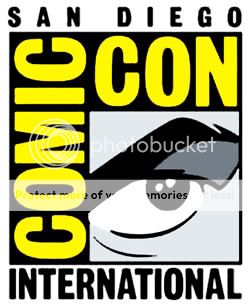
Are you guys still staying strong and ready for more Comic-Con highlights? Good, I thought so. Saturday is always an action-packed highlight day for the Con, with the best of science and entertainment panels saved for last. And this year did not disappoint. We got an up close and personal view of the very last Lost panel ever as we watched right from the stage and bring you great pictures and highlights from the panel. Thanks to two great friends from the production crew, we were able to enjoy the controversial Futurama! panel from backstage, where we caught up with the writers and producers. Along with a full transcript of the highly anticipated True Blood panel, we had two more great press rooms with Fringe and MythBusters. To be a part of the Comic-Con action, please click “continue reading.”
Lost
Panelists: Damon Lindeloff and Carlton Cuse (executive producers and head writers of Lost) and special guests to be named later.
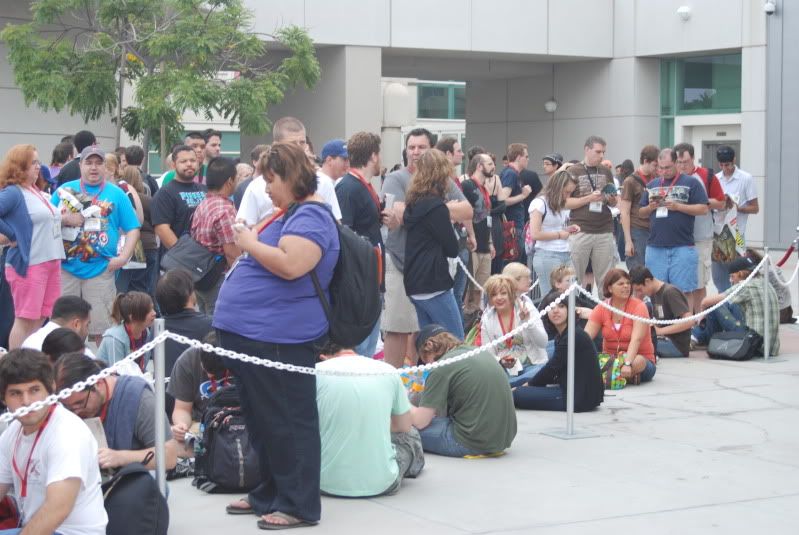
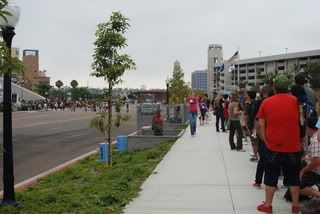
We can say with a high degree of scientific certainty that this year’s Lost panel, the last ever at Comic-Con, was the most anticipated event, as evidenced by queues that wrapped around the convention center, around the marina, and back. Some fans had started lining up in front of the Hall as early as 7 o’clock… the night before. Luckily for you, our faithful readers, ScriptPhD.com had a front and center seat right up on the stage with the press to take in every moment right up close as it happened. And since a picture is worth a thousand words, we decided to let you experience the full Lost panel in the pictures we snapped and with YouTube videos kindly recorded by Tostie Productions.
Part 1
Part 2
Part 3
A fun Season 6 promo!
And an even more fun parody video
As a supplement to the full videos, scroll down for some fun pictures capturing the best moments of the panel. Please credit all photography to ScriptPhD.com if you take these for your own use.
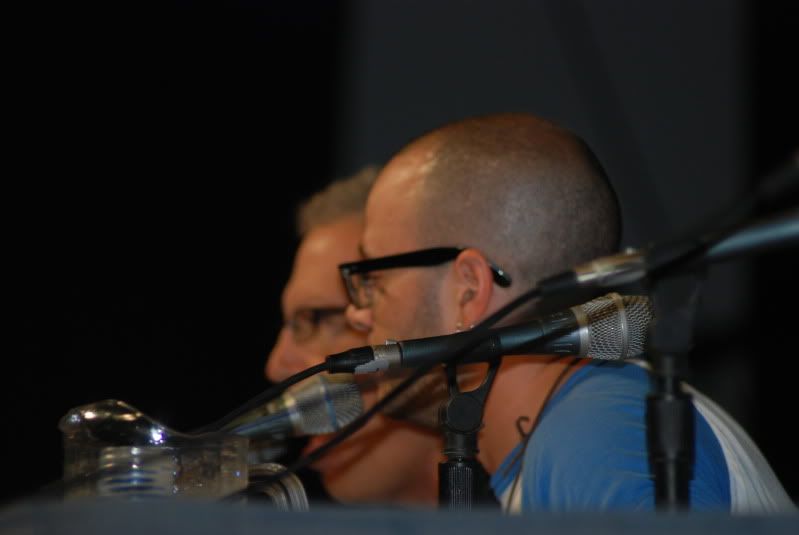
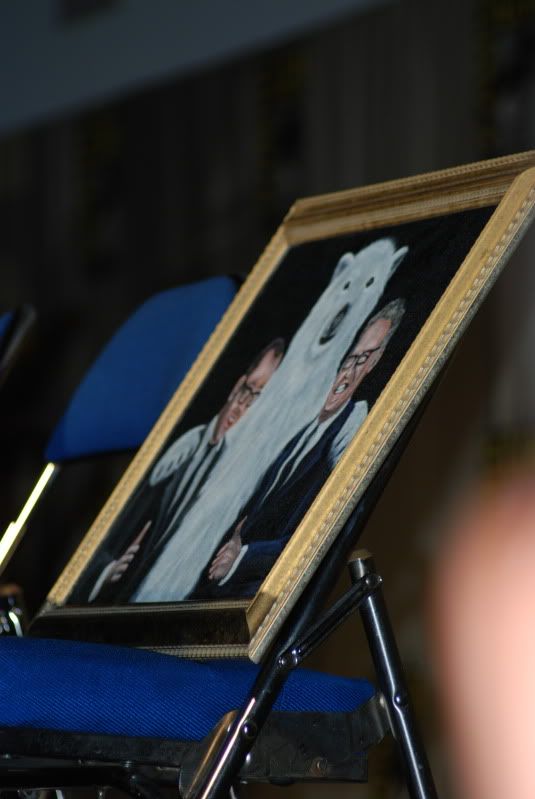
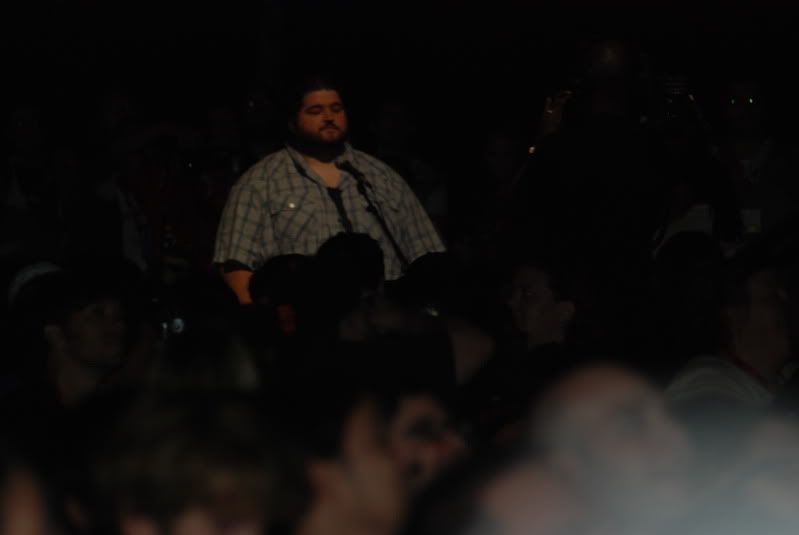
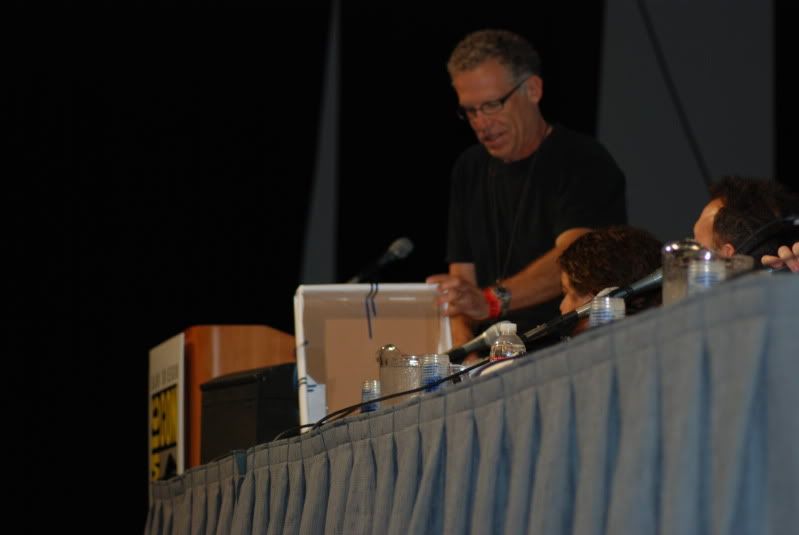
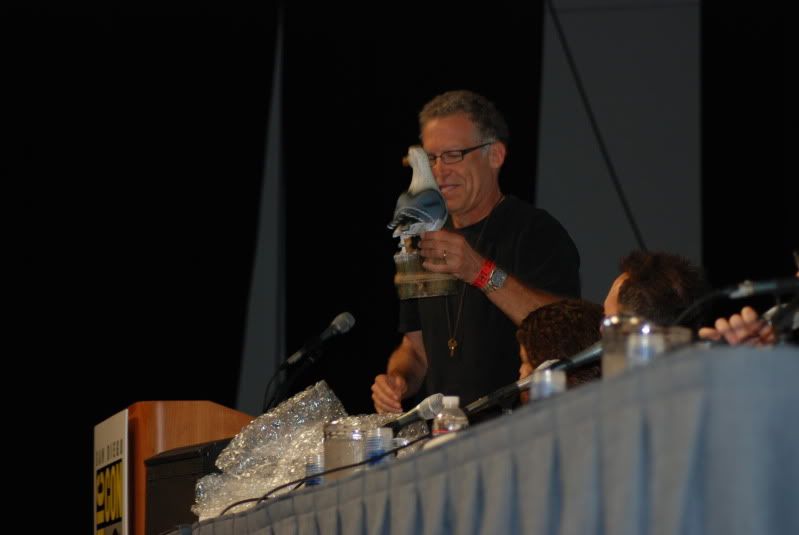
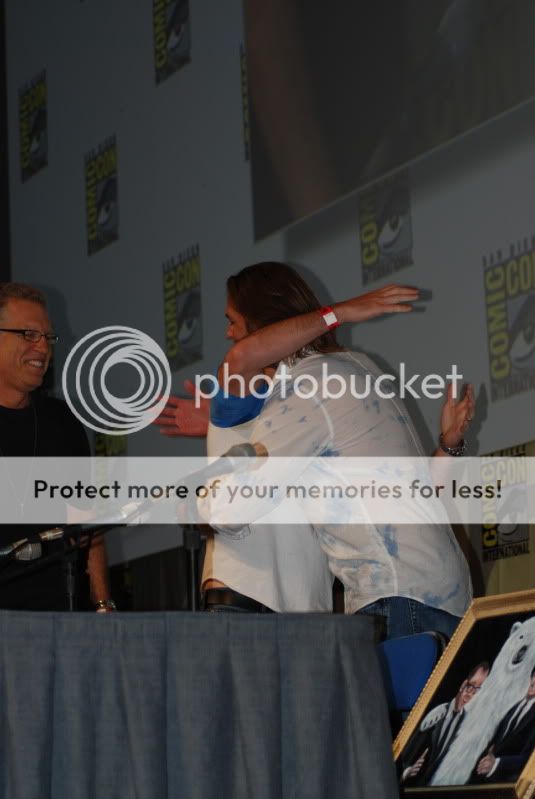


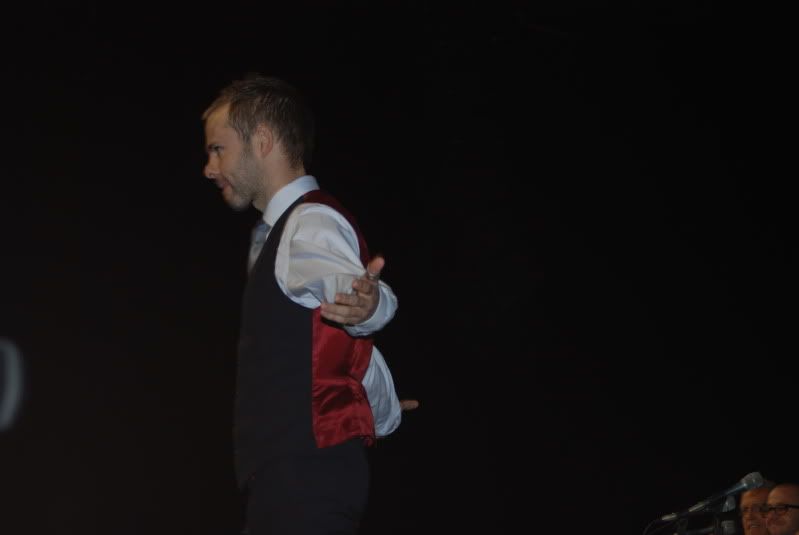
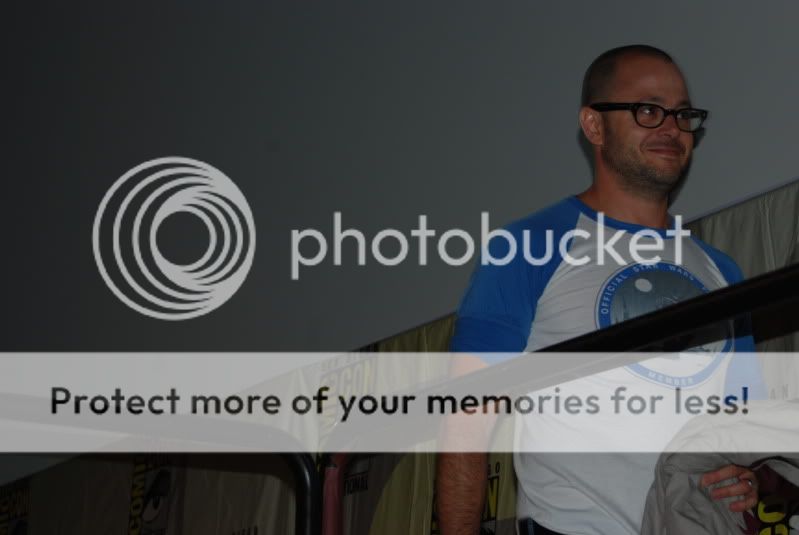
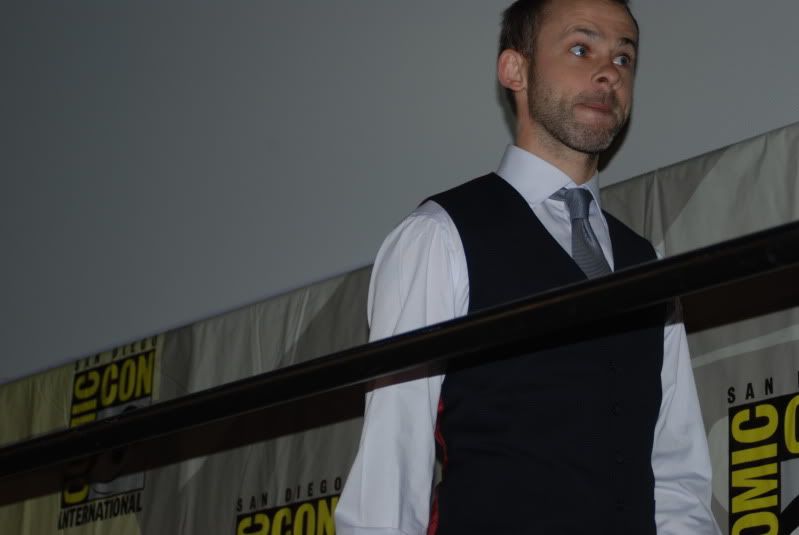
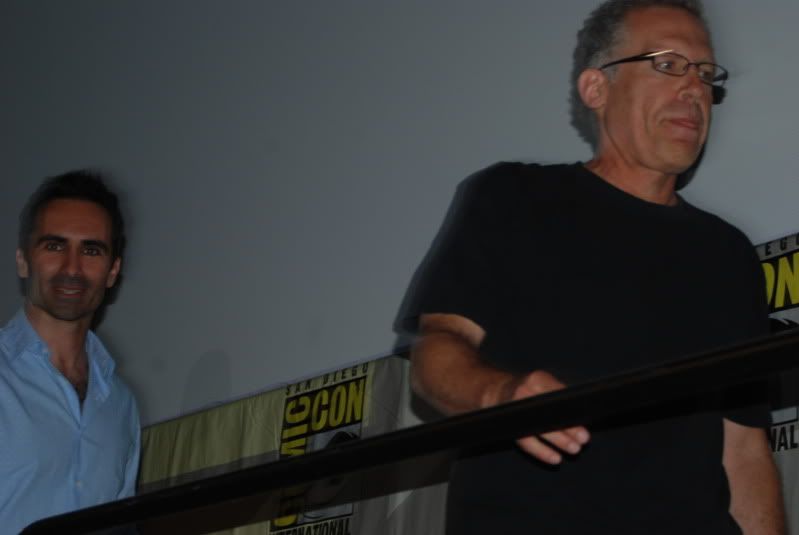
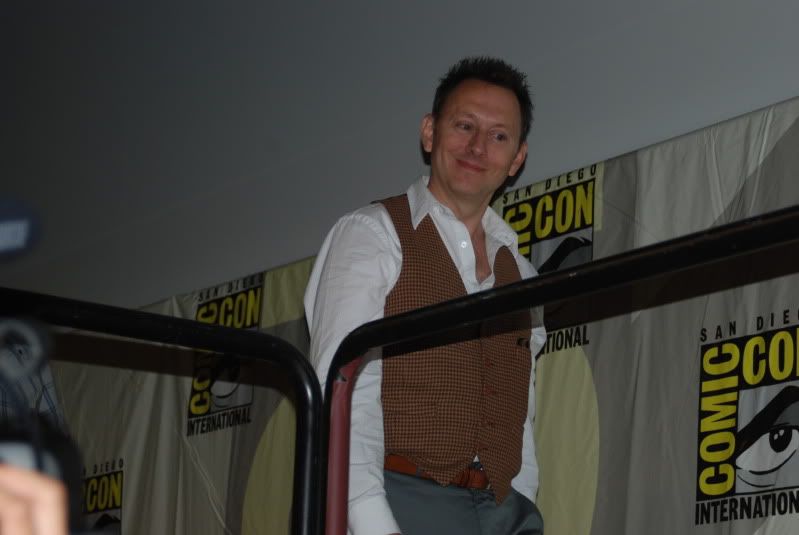
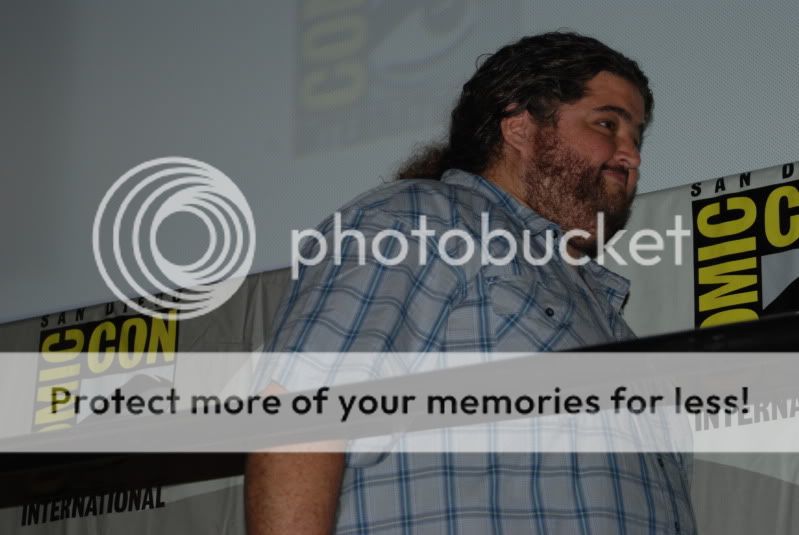
Futurama!
Moderator: Bill Morrison (Bongo Comics)
Panelists: Claudia Katz (producer/writer, Futurama), Patrick Verrone (Producer/writer, Futurama), Eric Kaplan (writer/producer, Futurama), Michael Rowe (producer, Futurama), David X. Cohen (Futurama, The Simpsons), Matt Groening (The Simpsons)
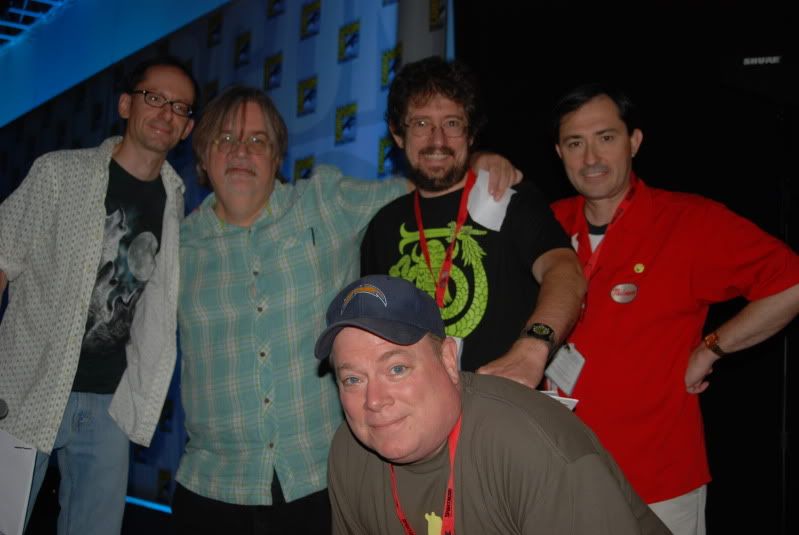
As many of you know, there has been a fair amount of controversy surrounding the return of FOX’s immensely popular animated show Futurama! due to contract negotiation issues with the actors doing the voices. The Futurama! panel was to have consisted of the voice talent, however because of the uncertainty of when and if the show would be renewed, animation and production talent appeared instead. Matt Groening began the morning by reading a humorous, sarcastic statement absolving Fox of blame for the situation. Due to time restrictions, the panelists saved time only for fan questions.
Producers showed a funny clip of Futurama! behind the scenes. (The clip is available as an extra on the DVD of Futurama!
Matt Groening: First of all we want to make it clear that we love our Futurama actors! We just hope that FOX and the actors can come to agreement ASAP. Let us continue.
David X. Cohen: We are mainly a panel of writers, and we decided to take advantage of that. S we are going to show you some samples of actual behind the scenes dialogue from writers’ room: things people have said over the years in the writers’ room that have been memorable, and we wrote index cards later. We saved them, Xeroxed them, and read them back, these are magic moments. And genuinely behind the scenes.
Example:
“We need to think about logistics?”
“What kind of logistics?”
“That’s what we need to talk about-there might not be any logistics”
“This is a light, romantic scene, so we don’t want him farting, puking and shitting diarrhea.”
“Were you nominnated for something?”
“No I’m a judge.”
“What did you judge?”
“Nothing, I forgot.” —re the Webby awards
“My monster manual is starting to smell.”
“Search for lame [on the script] going upwards.”
“Watch, it’ll highlight the whole script.”
“Inscincere compliments are still good.”
“Futurama brings the flava.”
At this point, the writers opened up the floor to fan questions, and each fan that asked a question got a prize out of the box to mimic what the Lost writers did during their panel at last year’s Comic-Con.
David X. Cohen: This is mostly Lost merchandise as prizes.
Fan: How do you guys keep continuity throughout the series? There’s a lot of references in later seasons from earlier seasons.
David X. Cohen: Fan sites, actually. We frequently consult with them, I’m proud and embarrased to say.
Fan: Beginning of the new season, are they going to end up in a random place or back home at Planet Express?
Matt Groening: David and I debated over that one. I thought it didn’t matter and that we should just start over. And David thought, no we have to address that world. So, he wore me down and that’s what we’ll do.
David X. Cohen: Exploring the story of that world wont be the thrust of the plot, we’ll get them back home, but yes we will address that world in the beginning for continuity.
Fan question: Do you guys expect to do Futurama! in theaters?
Erik Kaplan: Like puppet theaters?
Matt Groening: We’d love to do a Futurama theatrical, but we had premiere screenings at various movie theaters, we actually had one here at Comic-Con last year. It’s really fun to see it on the big screen. Hats off to the animators at Rough Draft for creating something that’s way beyond the boundaries of television, so we have watched the show on big screens. And we do plan on some work as a theatrical feature.
Fan: Will Leela and Bender ever get together?
David X. Cohen: We were right on the brink at the last season, and we will address that a little bit, but they’ll have their ups and downs in the new adventures. But of course it’s their ultimate destiny.
Fan: Is it harder to come up with jokes later in the series than in the beginning?
Michael Rowe: Can be hard at start, actually but later you learn from those mistakes. You get into the flow of the feel.
David X. Cohen: We’re at a certain point now with the show where that curve is leveling up, but someone will say, “Wait we did that in Season 3” so then we remember a hilarious joke we did and do a twist on that.
Michael Rowe: We’ll have to go back to the DVDs and change it!
Patrick Verrone: It’s actually much harder to come up with stories than jokes.
Fan: What was the inspiration for Nibbler?
Matt Groening: That was my idea of designing something cute, my Ewok.
Matt then gave this fan the uber-prize for best costume they’d seen all day.
Fan: Will there be any major characters that we’ve come to know and love next season?
Michael Rowe: I guess it depends on the actors [and the contract resolution].
David X. Cohen: We’re not going for anything big.
Matt Groening: But we’re planning to reveal the secret origin of Scruffy. He is not what he seems.
Patrick Veronne: I was home working on a script for a concept called “Twitter in the Year 3000”, which I’m working on right now. I’m hoping to involve you the fans from here at home, but that may get written out. We’ll probably call it something else because of the Twitter copyrights.
Michael Rowe: We’re going to have a shocking, unlikely relationship. Bender and Amy. It’s hot and heavy. Bender is due for a lot of it. And it even turns into marriage.
David X. Cohen: There’s a controversy about the robosexual marriage aspect of it.
Michael Rowe: Yes, it’s human/robot marriage, I heard there was Proposition Infinity to address the controversy of it. [laughter from audience—he’s ripping on Proposition 8 in California to repeal gay marriage.]
David X. Cohen: There is going to be a literal rebirthing of the show. We have another big one in the works: Ken Heeler, Zapp Brennigan, and Leela stranded together on an island.
Matt Groening: We have another one where Fry arrives early for once in his life to meet up with Leela. And Fry and the Professor get into time machine to skip over the 10 minutes so they don’t have to wait, only they go forward 10 years on accident. They keep going forward in time, hoping that eventually they’ll get into a time machine that goes bakcwards. I can’t say anymore… well all right I’ll tell you. The universe collapses. That’s all I can say.
Patrick Verrone: [Off-topic—all the panelists got a Hershey’s kiss during Comic-Con.] I disovered you can turn a Hershey’s kiss into a gelatinous blob.
Erik Kaplan: Someone here has a figurine of Judge Sotomayor.
Fan: Are you guys planning on doing any more mythology episodes?
David X. Cohen: 100% chance. Definitely, it’s in the works!
Fan: Simpsons episodes tend to parallel other works. Does Futurama parallel sci-fi?
Matt Groening: Yeah, we tried to do a bit of that. To create a broad enough sci-fi universe to have fun with all sorts of sci-fi. But we didn’t want to do parodies, although we did do our Star Trek episode with the original cast. But mostly, we keep it to a lot of references to literary science fiction.
Fan: Is there a Zoidberg story in the works?
DXC: That is an episode we want to do this year. Why did the Professor hire Dr. Zoidberg? We want to do the origin of them meeting many years ago. Yes, although it’s the Professor who will mainly star in the episode, we still want to do that backstory as a part of it.
Matt Groening: Some guy came up to me and showed me his Zoidberg tattoo on his arm. And I was so amazed by it, I told him “I can’t believe you got that.” And the guy said, “Yeah, everybody gets Bender!”
Fan: Are we speaking to the original writers here today? Is there a difference between the Fox and Comedy Central versions?
David X. Cohen: Well, the format has changed. It’s more of a feature piece with more music, battle scenes, andepic scenes. It’s really hard to watch 90 minutes straight of jokes. You have to pace it out differently.
Michael Rowe: It’s four half hour shows in one movie, and we had to make them work.
Matt Groening: In the middle fo the third one there was a writers’ strike, so that also may be accounting for some of the inconsistency that you notice.
David X. Cohen: There were three huge events at 22, 44, and 66 minutes in the new format. There were challenges to it, but it worked to our advantage. Ultimately, it’s up to you the viewer to decide where we succeeded, where we didn’t.
Fan: What was the creative evoluton of Zapp Brennagan sleeping with Amy Wong?
David X. Cohen: Given an infinite amount of time, all possible pairings would occur eventually. This idea seemed like it would create good tension between our characters. It did. This is why Amy and Bender have their deal down the line. It creates more cross-breeding.
Fan: You’ve created celeb guest heads. Any exciting ones planned for the future?
DXC: We can’t talk about it until the actor resolution. Until the person agrees to record it, we can’t announce anything. Generic answer yes, but we do have every exciting big names planned. Ufortunately we can’t elaborate.
Bill Morrison: Any parting words?
David X. Cohen: Keep your fingers crossed. This is business, and we’re just hoping for the best. Many cast members are still around, things are good between us. Just hope for the best and it may come true.
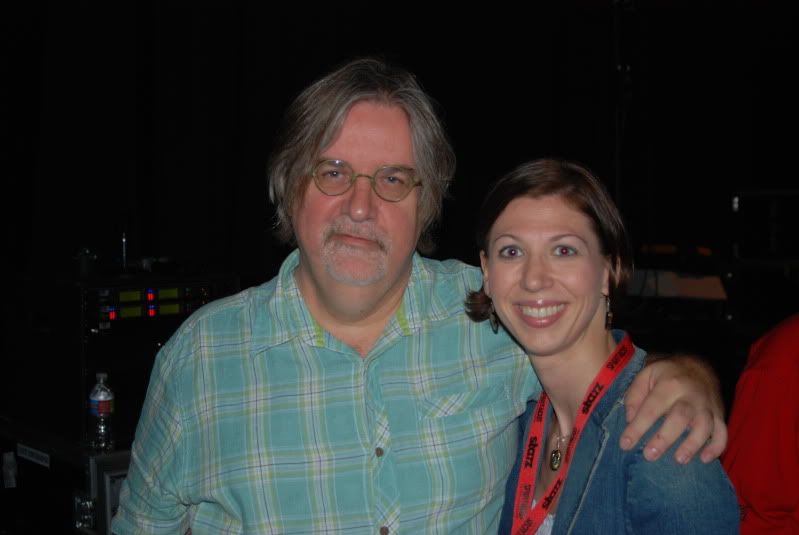
By this point of Comic-Con, the journalists and media covering the event are running mostly on coffee, adrenaline and the never-ending desire to get sleep… someday. After three straight days of virtually no sleep, wall to wall coverage, running the marathon to get from one end of the Convention Center to the other, all while dodging nerds and egregious violations of personal space, you might be wondering what the atmosphere is like by now in the press rooms? Pretty darned silly! Check it out:
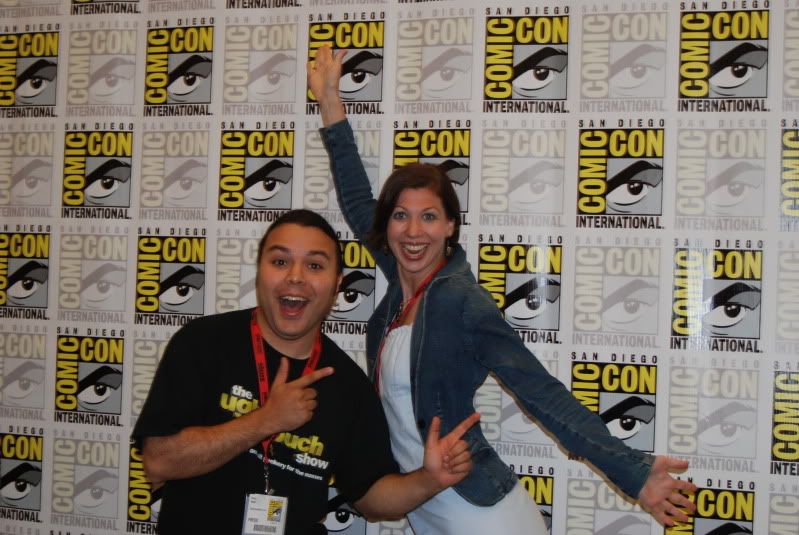
From the Press Room: Fringe
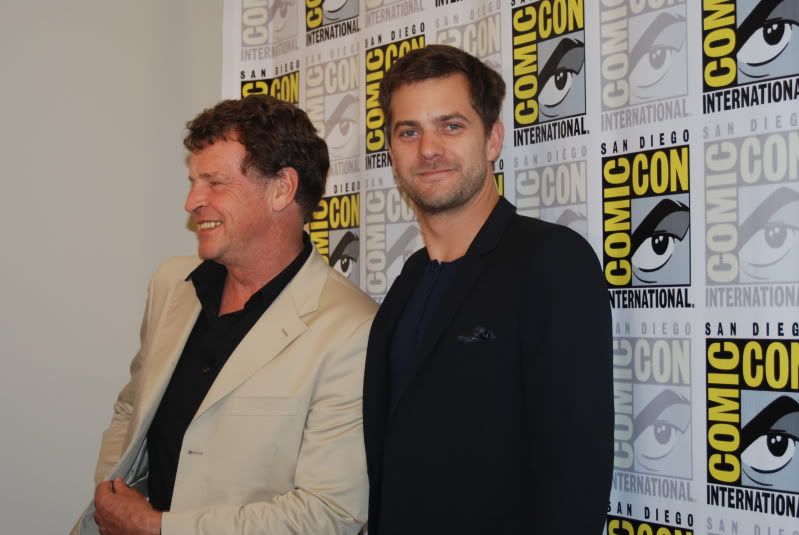
Roberto Orci, Alex Kurtzman, Jeff Pinker (series showrunners)
[ScriptPhD note: please forgive us for not delineating between the three showrunners for this particular part of the interview—they had to move very quickly from table to table, and it was tough for us to tell the voices apart in transcription. Thanks for understanding!]
Press question: How is the rewriting going? There was a whole conversation about it at the Paley Television Festival.
Showrunners: It’s going really well. We now know what the show is to a much greater degree. In a first season show, you’re really trying to find it, you’re trying to find the voice, trying to find what works and what doesn’t work, and like most shows that I’ve been associated with, the characters and the actors playing them start to become more one. And it’s a much easier time for writers who are joining the second season. The learning curve is much steeper. And they learn much faster. And they’re working out great. We’re just having fun with it.
Press question: Is there a plan for this season? Have you guys all sat down and…
Showrunners: We have a plot arc, a plan for this season, we have characters arcs planned for the season, and beyond.
I think in general, we’re much better prepared this season than we were last season. I think it’s hard for any show on earth, you’re in the first season, you’re finding your feet. So I think it’s a major improvement for us: what works on the show, what is the balance between the A story and the B story, which characters do better in what storylines? And it’s really a trial by fire. And hopefully if things are going well, by the end of the first season, everything slots into place. And that really happened. I think we all tangibly felt by the end of the first season that the show had really found its stride.
Press question: So when you’re plottig time for the show, what are the terms that you’re using for the different worlds?
Showrunners: We say our reality and the other reality.
ScriptPhD: Do you guys mind if I ask you a sciencey question?
Showrunners: As long as you don’t embarrass us! [laugher]
ScriptPhD: Promise. I represent ScriptPhD.com, we’re one of the few sites that covers science in entertainment. Really enjoyed the panel with your writers and your science advisor Ricardo Gil de Costa. He talked a little bit about his role, and I wanted to get the reverse, straight from the horses mouths.
Showrunners: Which one of us is the horse in that equation?
ScriptPhD: It’s just a saying!
Showrunners: It’s a collective horse.
ScriptPhD: It’s a collective horse, a proverbial horse. Tell me a little bit about how you use Ricardo’s expertise, and how that works in the mix of the science that you approach and obviously you are entertaining first and foremost?
Showrunners: We are entertaining first and foremost. We made a rule very early on that our show would not have aliens. Because The X-Files had done that so well. And we made another rule that all the science would be plausible, based on the science that’s currently accepted or at least proto-science. So the stories come from two different directions. One, we’ll come up with an idea that we really love and we’ll say, well, make the science work. Or, we’ll start with the science and ask where the story is in this.
ScriptPhD: And what role will Ricardo play in this process? How will you use his expertise?
Showrunners: Basically, it’s educating us about the language of the science, that we can rip creatively on it. You want to use the terms that are—we cheated, we tried to make it evocative and creative. So we’ll start with an actual article, actual reasearch, actual cases, and let that inspire us. As opposed to making stuff up. Everything that you’ve seen on the show has had some article that was the basis of it. You can see on any mainstream website or news outlet, the science and technology section has some very strange stories. It used to be that you really had to search these things out. And now you really can look at mainstream science and be inspired to imagine this really great stuff.
Press question: One of the things that makes it really successful is the science. Some people have asked about the romance, which for me personally is a bit too soon. In the second season, where are we on the Peter/Olivia romance?
Showrunners: I think we’re in a place where—I assume you’re talking about Josh and Anna—they’re more familiar. It’s more brotherly and sisterly right now and more of a caretaking role. As we go into the second season, our stories are starting to be driven by the characters as opposed to outside in. And if you saw our season finale, Olivia ended up in the other universe, and she’s going to come back, and there’s going to be consequences of what’s been done to her and what’s been happening to her. And she, in many ways, is going to become affected by the cases and this world. And he’s going to have to take more of a caretaker role towards her. It’s also very important for all of us that in doing a romance, you have to buy it. The characters have to organically get to a place where you would believe it. As opposed to forcing them together just to do it. Olivia’s character has so many walls. She was in love with someone who burned her badly, so she’s going to be very unwilling to trust again. And Peter has his own issues too. So I think if we do it, we really want it to happen organically, so that the fans buy it.
J.H. Wyman (writer/co-executive producer)
J.H. Wyman: Well, I’m the showrunner, with Jeff Pinkner, just so you know.
ScriptPhD: With Peter, how much are you going to go into the two realities. This reality versus the other reality? And where are you going to go with that?
JW: I can say that Peter is actually going to learn a lot of things about his existence, who he is, what’s going on, we’re going to delve into many things that will bang Peter out as a character. And make him the hero I think he wants to become. That’s all I can say about it.
ScriptPhD: But you are eventually taking us on a path where we’re going to learn about all of this?
JW: Look, you watch the program so you know that there’s enough answers in there to—I mean, it’s amazing the theories that people will come up with. It’s really quite wonderful. But yes, we’re definitely going to be able to delve into that and talk more about what we’re investigating in Fringe.
Press question: So we know there was this other reality Peter. Well, we think so. Is there another reality massive dymanic that enriches the world? Are we going to learn more about that?
JW: I would say that’s an interesting theory. I don’t mean to sound cagey about it. I think there are certain things the fans are trying to work out and figure out and the direction that we’re going down right now absolutely follows that line of thinking. But I don’t want to be cagey about what you’re going to see, but I promise it will really play your mind, because it does mine. It’s fun, you know? Really fun!
Press question: Any clues?
JW: Let’s talk about how the show is different, and there’s so many clues in that. Let’s talk about why it’s Fringe 2.0 instead of the original, and why it’s getting better I think.
Press question: So we know there’s not going to be aliens, what other things can we expect that we haven’t seen yet, as far as the fantasy and science fiction minus the aliens?
JW: It’s funny you should say that, because we literally made a whole—you know at the beginning, there’s the words, and we’ve done most of those words. Now, we’ve come up with a whole bunch of words—there’s many things beyond alien that you’re going to see that will frighten you and hopefully make you think science is dangerously out of control. But what’s really important, and the key to the characters and what’s happening this year, and why the show is different this year as opposed to last year, is that we’re actually—I would consider the first season a prologue, that’s my take on it. Here’s the show, here’s what you’re going to be doing with it, here’s the things that are happening, science is out of control, much more advanced than you would even imagine, here are the characters and the players. Now the second season is: let’s get involved into these people’s lives. And I think that that is the key to all the questions that you were asking. You’re going to fall in love with it. Like this year, Walter’s emancipation. He’s going to come out and come into his own and Peter’s going to have to let him, it’s really delicious stuff you know? Olivia’s going to start to develop in her own way, Peter in his own way, things that you never imagined you’d get to spend time with them, like last year in their houses and this year you will.
ScriptPhD: Like the relationship between Walter and Peter will develop.
JW: Oh, that’s one of my favorite things, yeah!
ScriptPhD: I really love that part of the show!
JW: I’m so glad you say that because it’s a big part. Yeah.
Press question: You just started shooting in Vancouver, just like another show, Supernatural. Can you talk about what that’s been like?
JW: We were in New York, and just cost-efficiency wise, we brought it to Vancouver. They allowed us to do much more. Because our money goes further, because of the Canadian dollar, and the production value goes up. The things that we’re planning to do this year really do take a certain amount of finance and fiscal responsibility to be able to do, so we figure we can definitely get much more money to do them. And we’re ecstatic. It was a smooth move, all our keys are still with us, and we found great people there, the nicest people ever. You can’t imagine. You go there and they’re just the sweetest people.
Press question: How much does the fans’ reaction to the show influence you in writing it?
JW: A lot. For me. I did read what they said about Season 1, going into Season 2. Because you have your own perceptions as a writer. You look at it and you’re going, “This is the story that I’m compelled by. I love the science and I love all that stuff, but what do I like?” And then when you start to write from that spot, you start to realize, oh when I’m really telling the truth, everybody responds. And people seem to pick up on the smallest little things. So I say, “Oh, everybody loves Walter in this! Oh, they love that moment.” And you realize that that’s something that you wanted to investigate so let’s do that. And I’m always looking at what they have to say, because that’s why we’re doing this, is so people can discover the program. And I still think not enough people have. And it’s really something, what the show is. The more that I can hear from the viewer, the more that I can do my job. Because, it’s not to write for them, but they’re a parter of sorts. I don’t want to write a show that fifteen people watch.
ScriptPhD: That’s really refreshing, because there are other showrunners [no names shall be mentioned ?] that are like, it’s my vision, it’s my show…
JW: No, no, no. I’m much more secure than that! I certainly have a vision…
ScriptPhD: I’m just amazed, because I’m a fan and a journalist and it’s really refreshing to me that when I watch the show, I know there’s a symbiotic existence between you and your fans, and a synergy there to make the show possible, and I think that’s just terrific.
JW: I did a very small program in the UK called “Key and Eddy”, a show in London. And I did it in 2001, and I still get people calling and asking what I was thinking for the rest of the show, because it only ran 13 episodes. And it left kind of a big question mark. It was very much ahead of its time. They still email and call and say this or that, there’s a whole movement, and they’re there. And it’s so hard these days to find time for appointment television, and the point is that when you’re asking someone in this busy time to commit to your show, the five minutes that they have in their day, I want them to feel like they are appreciated.
Anna Torv (Olivia Dunham)
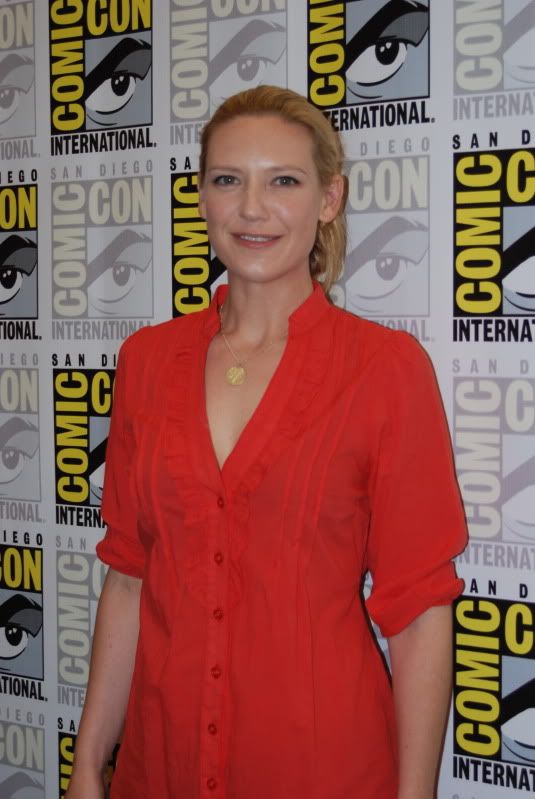
Press question: Do we get to see more of your superpowers next season?
Anna Torv: I know for sure that we will.
Press question: Are they going to have a darkness to them?
AT: Oh I hope so! I want Olivia to get darker, I think. I kind of like the dark Olivia the most. I like the episodes where something personal has happened to her, like when she was taken and had her spinal tap and she came out and she was ready to kill someone. Or when she was killing people in her sleep. I like her darker.
Press question: How long have you been living in the United States, and have you been hanging out with any of the other Australian actors here?
AT: I didn’t live in the States at all until I did the show, so I’d been over and visited a little bit, and had met with agents to see if I could get representation, but I never lived here until I moved to New York for the show. I moved over a year ago. I don’t know any of the other actors, I missed out on all of that, because we were based in New York. I heard that they have all these barbecues and things like that.
Press question: So is Australia still home for you?
AT: Yeah. I go back every break I get. I love Australia!
Press question: Do you get used to the hectic, frantic work schedule a show like this requires?
AT: Yes, I think you just do get used to it. And it’s—I love it when I get to do physical stuff, which I don’t get to do a lot of, actually. I think it looks like I get to do more than I actually do. But really, I don’t get to do that much! No, I’d like to do more of that, sure!
Press question: How are the scenes shot with Leonard Nimoy at the end of last season going to play into this season?
AT: No, I do know, but I can’t tell you. But you do get to find out. So you do eventually see the rest of that scene, but in a really cool way, actually.
Press question: Do you have anything that’s happened to you like that in your past like Olivia, from your childhood?
AT: You know, someone just asked me that! No, there’s nothing that I can think of! I’m sure if I really thought about it, but no.
Press question: Can you talk a bit about your hobbies and lifestyles and what you like to do?
AT: When I’m not working! [laughs] Well, I’m from Australia, so I surf, and I grew up near the beach and we always had horses. I love riding horses! I keep trying to get them to do something where Olivia gets to go jumping or something. I don’t know, I hang out. I’m a homebody.
ScriptPhD: Are you excited about where Olivia’s relationship with Peter is going, and can you talk about working with Joshua and your guys’s dynamic?
AT: Well I know! Everyone keeps saying what’s going to happen with Peter and Olivia? And I’m like, “Did you watch the first season? He started picking up my sister!” I’m not sure where I want them to go. I just read an episode that we haven’t started shooting yet, we’re about to start shooting next week, and Olivia starts to see Peter a little bit differently. And I think it’s kind of fun! I can’t say anything more. That’s it!
Press question: Can you talk about being glamorous on the show and yet, still playing a strong woman character?
AT: I don’t know, I think they don’t write her glamorous, but we’ve always been—like when we started with the pilot, we were always adamant that it’s TV, so nothing’s really realistic, but you can do your best. Like she doesn’t wear a lot of lipstick and I don’t know. You do what you can.
Press question: What have you loved about her vulnerability aside from a lot of the action that you’ve gotten to see?
AT: I love the episode where she dreams, which was where she starts having these dreams where she’s killing these people and then she finds out. I love that because I thought it was a really beautifully written episode, and I thought it was one of my favorite bits of Fringe, and I personally loved the shadowy, secretive, dark, what’s going on stuff. It also was where she found out about the early experiments and Walter did that to her. I loved that because through a lot of the first season, I felt like there wasn’t a real personal connection with Olivia and Walter and now, all of a sudden, there’s something there beyond just what we were experimenting on.
Press question: And will that come into play this season?
AT: We haven’t gone back to it as intensely as we did at the end of the last season, but it’s definitely still there and I think it will pop up again.
Press question: Is there an awkwardness to your and Peter’s relationship now when you’re working on cases because you know that?
AT: Sometimes, yeah. Sometimes.
Jasika Nicole (Astrid Farnsworth)
Press question: I heard rumors that we are going to see more of Astrid in the season to come?
Jasika Nicole: If you heard it, and I heard it, it must be true! Astrid, you’ll get to see a softer side of Astrid. She was often the person put up against Walter because they were so different—the young, the old, the new technology versus the old, book-savviness and everything. So we would have these funny quips, but she’s more than just that. I think that her purpose, at least in this season, is more than just providing some comic relief and one-line quips. And so she has this really fantastic scene that we filmed the other day with Walter where you get to see their personal relationship. You get to see why they click and work so well together. It’s not because she rolls her eyes at him all the time. Which she does, that’s certainly a part of her, but she’s also much deeper than that. I’m hoping that you get to see more than that—her connecting emotionally with the other characters on the team.
Press question: let me just say this. It is so great to have a person of color have such a smart and intelligent role. You don’t see that on television—
JN: And how!
ScriptPhD: And that it’s not a big deal! It’s just a part of who she is, but it doesn’t have anything to do with her abilities.
JN: Yeah, totally! It’s like, “You got into college?!”
Press question: What are we going to find out about Astrid’s history and how she got to the place she is?
JN: You know, these are all questions that I don’t have answers to, and I’m hoping that they do get answered at some point. I want to know why she decided to become an FBI agent and where did she come from and I want to know those things. I wish I could say for sure that yes, it’s going to happen, but I will say that we have brought another person into the Fringe world. Her name is Megan Markel, and she plays an FBI agent, and she is also bi-racial. Let’s talk about that. It’s awesome! And I was so excited, because it wasn’t like, “Oh we can only have one. Oh we can’t have more than this one actress.” Like you said, it was no big deal. Here’s this gorgeous woman on the show, and she’s really, really smart too, and she’s an FBI agent, it’s just awesome.
Press question: I think it’s great to have people like you on the show, because science and technology are becoming so wide-spread and it’s a wide demographic, it’s great to show that anyone can really be a part of this world. What integrated storylines can you talk about given what you’ve already shot?
JN: Thank you so much. With this new character, and I can’t speak about her too much, obviously, but we’re actually going to start talking about the aspect of religion, and how you balance that out with science, which has kind of been a battle of ideologies for a really long time. So we start to address that in this season. We’ve only completed three episodes, so we don’t know how far it’s going to go, but I really like it, because it’s really exciting! What do you do with your faith that you have grown up with and is a huge part of you, and then how do you combat that against these things that are happening and all this death and destruction? You hear that someone is in charge of it and it’s not the God that you’re familiar with, so I think that’s a really cool thing that we’re starting to incorporate into this season. I have no idea where it’s going to go.
ScriptPhD: Reading the scripts and seeing the science material, do you ever just geek out? Normally as an actor, normally you don’t get to do stuff that’s this heavy and technical. Do you ever just get to thinking about some of the issues that the show raises and it bleeds into your own consciousness?
JN: Absolutely! Oh yeah! I do a lot of Googling, because there’s a lot of words that I am completely unfamiliar with. Like, “I don’t know WHAT that is!” But I think I’m most intrigued by the idea of there being this other universe because what they’re saying with that is that as a person, you make decisions in your life, you have all these choices, and you make a decision. But you can also make the decision that you didn’t make, and so there is a world in which you exist where you made that decision. And a world where you exist and you made this decision. So it might not even be one parallel universe, it could just be tons and tons of them for every single choice that you made that is not this one, but it was that one. Which is kind of like looking through a mirror—it just goes on forever and ever! And you think about what kind of person you would be. And I guess that at some opportunity, they’re going to get to meet themselves and see what kind of person they would be if they did this and that. I made that up, I don’t know if that’s true.
Press question: Can you talk about your work schedule, given that your character doesn’t appear all the time?
JN: I think most people are pretty jealous of me. I have kind of the perfect schedule—I come in and I work for maybe two days a week, and then I just… have the rest of my time to myself. And that’s been super-important since we moved to Vancouver. We’re in this new city, and we want to explore, and see what Vancouver has to offer. I got a bike, I can ride around. It’s been a nice transition for me, because if I had been like Olivia’s character, and thrust into this situation that was completely foreign to me, and then having to work 15, 16 hours every single day for 10 months, that has really got to make you a bit loopy. And I didn’t have to deal with that. I just had to deal with my own loopiness that I had from the beginning.
Press question: When did it finally dawn on you that you had a successful show and that this was real?
JN: You know what I think it was? I think it was when the observers started showing up in real life and not on the show, and I was like, “OK, they’re trying to make this like a brand, kind of.” He’s at this game, at NASCAR, and it didn’t have anything to do with the show, they would just be filming him and putting him out there to promote this whole idea. And I thought that was kind of huge and really neat! Maybe next, we’ll have Afro wigs [to promote the show].
ScriptPhD: This is kind of your first big break-out role. Is it weird for you when people recognize you?
JN: It’s weird. But you know, no one creepy or scary or anything has come up to me. It’s only been the nicest, sweetest, most complimentary people. So it’s weird to be recognized, but then you have this really awesome conversation and they tell you their theories about the show, and you tell them yours, and then you part ways. It’s great. It hasn’t interfered in a negative way at all, which is great.
Joshua Jackson (Peter Bishop)
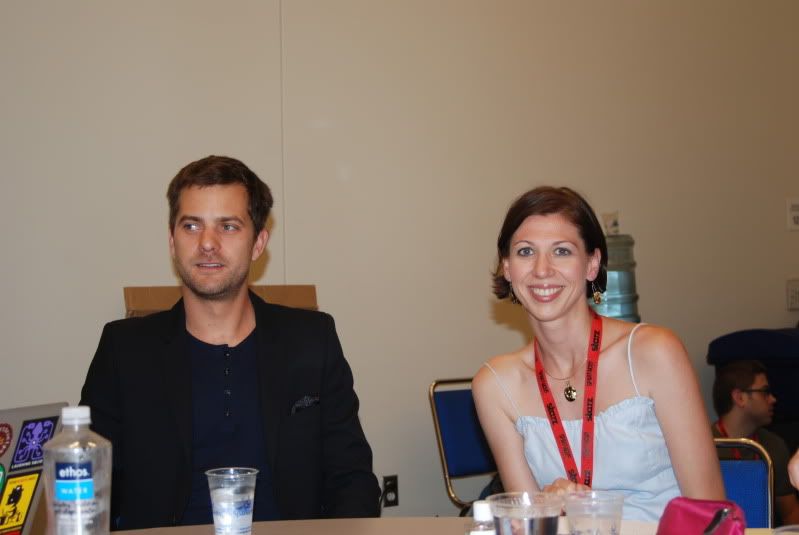
Press question: How has the move to Vancouver to shoot the show affected you?
Joshua Jackson: Well, Vancouver is my hometown, so in its way, it’s moving home for me. Personally, it’s actually not difficult at all. Inevitably, it changes the urban-ness of the show. It doesn’t change the urban nature of the show, but the West Coast of Canada is very different than Brooklyn, which is where we shot most of Season 1. So that changes a bit. There’s a certain bittersweetness—and this is all behind the camera stuff—eventually the television becomes the people who make it. Moreso even than the actors or the writers. It becomes a machine, and the cogs of the machine are all of us sort of doing our bit and putting in. And to move the show, we had to lose 100 people, 140 people actually, who were employed on our show. So there’s a certain degree of bittersweetness, because without their hard work, we don’t get to Season 2. And in a just world, you don’t repay that hard work with a pink slip. So I feel a bit guilty that I’m going home and that’s fine for me, because for other people that is not fine for them.
Press question: Is it still home for you, in a sense, or have things changed since you’ve been away?
JJ: Have you ever been to Vancouver? Nobody leaves Vancouver. It’s paradise. It wasn’t until I moved to North Carolina, and was in a discussion with somebody who will remain nameless because I don’t want to bag on her hometown, but it wasn’t until I moved to NC and started working with somebody and they said, “God I’m so happy to be away from home!” that I realized some people don’t like where they grew up. Vancouver is paradise! It’s a perfect, perfect place, especially if you’re an outdoorsy person. It’s heaven, so…
Press question: But it’s been getting bad press about the drug wars at the moment, no?
JJ: [laughs] Yeah, I know. Have you been in downtown LA? East Hastings is a legitimately bad neighborhood. It’s on par with any of the worst neighborhoods that I’ve been in anywhere on the planet. But if you’re not a moron, you’re probably not going to get involved in a drug shootout. Or if you’re not an addict. So there are many ways to not get involved in a drug war between the Triads and the Hell’s Angels.
Press question: To get away from the real world and to get back into our favorite virtual world [laughter], we started to see Peter bringing in a bit of his underground connections, his underground connections for the end of last season, so are we going to see more of that next season, or is it more of you using your heightened superpower?
JJ: Sha-na-na-na-na-na! I think we spent the better part of the first season why it was specifically that Olivia Dunham needed to be the leader of the Fringe world. What we didn’t do—we talked about it, we hinted at it—but we never really saw what Peter was outside of this world, because we never visit him outside of this world. He’s always assisting and investigating hits. Then, you get to the end of the first season, and Peter becomes invested in this world. And now he starts to use his powers for good rather than evil. And, he starts to invest this very shady knowledge that he has and his personal immorality. He doesn’t have a moral attachment to things being good or bad. He is presented with a problem, he comes up with a solution, it doesn’t really matter if he breaks some eggs along the way. And I think he’s sort of figuring out his humanity as the second season is going on.
Press question: Can you talk about Peter’s relationship with Walter and how will that be developed?
JJ: Well, for myself, and I say this as an actor and not a person on the show, for Josh the actor, the most important relationship on the show to nurture and maintain is the Walter-Peter relationship. John Bishop and I spent a lot of time talking about where we are in the season, and pushing and pulling, and John is an endlessly inventive guy. And we work well together. So there’s always this state of play on set. That being said, that huge reveal about Peter not being one of us at the end of the first season is inevitably going to lead to a breakup. So until the breakup, I think you want to see these guys become closer and closer and more and more into a healthy father/son relationship and then poof.
ScriptPhD: Josh, can you talk about when you first got the material. This is very different from work you’ve done in the past, especially with the science. Talk about how you reacted viscerally to the show when you first got the script, and what about this really drew an appeal for you as an actor?
JJ: Well, the initial script, which I guess isn’t too surprising given who the writers were, read much more like a film than a television show. It was a two-hour pilot, so it was long, but incredibly in-depth, and with all of these multi-layered story points where things were not as they seemed and I just thought it was really well-done and well tought-out. And having worked in television before you also have to see how this idea behind the pilot could spin out 40, 60, 80 to 100 other ideas that could be interesting. And I think this group of guys has a pretty good track record with being able to do that. And I’m a sci-fi head, so…
ScriptPhD: You are? How cool!
JJ: Yeah!
That’s right folks, you heard it here. Joshua Jackson is a sci-fi geek. See? Science is awesome!
True Blood
Moderator: Kate Hahn (TV Guide)
Panelists: Anna Paquin (Sookie Stackhouse), Stephen Moyer (Bill Compton), Alan Ball (creator/executive producer), Nelsan Ellis (Lafayette Reynolds), Rutina Wesley (Tara Thornton), Sam Tremmell (Sam Merlotte), Michelle Forbes (Maryann Forrester), Alexander Skarsgard (Eric Northman) and Deborah Ann Wolf (Jessica Hamby) and Charlaine Harris (author)
Kate Hahn: I want to introduce myself. I’m a writer for TV Guide, and I’ve worked with Alan and the cast quite a bit, I worked with them for the TV Guide cover story and am thrilled to be here. We are going to kick off tonight with very special announcement from Alan Ball.
Alan holds up True Blood: The Drink to wild applause from the audience.
Alan Ball: True Blood: The Drink is a reality now. Those of you here at the panel last year know that it’s a very specific makeup. We couldn’t make up synthetic blood, so instead we used a nice mixture of Chateau La Feet Rotschild with blood of hemophiliac royalty, Viagra, Vicodin and vodka. …and ecstasy. Unfortunately it’s illegal. All kidding aside, though, there is a True Blood drink available September 10th. And it’s basically blood orange soda from all-natural ingredients. Just in time for Season 2 of True Blood.
Kate Hahn: Anna, Sookie has gotten in a lot of jeopardy and will be in more trouble as Season 2 progresses. How has she changed this season?
Anna Paquin: After last season, she is stronger, tougher, she’s been through a lot, she’s grown up quickly, and she tends to get herself involved in situations she can’t control, in which case it is good to have a vampire boyfriend. As far as portraying her, I’m just trying to imagine going through that in two weeks, and find myself in these situations. But that’s my job.
Kate Hahn: Stephen, Sookie’s being admired by multiple vampires. Hypothetically speaking, if something were to happen between Eric and Sookie, how would Bill respond?
Stephen Moyer: It’s hard to get away from that rangy Swede at the end of the table, but I’m not sure Bill would roll over and just let it happen. He’ll fight his hardest and not be quite as polite as he’s been up to this point.
Kate Hahn: We’ve seen really big changes with Tara. What is your take on how she’s changed as more of her softer side has come out?
Rutina Wesley: I like playing the softer side of her to show her vulnerability. I call her a hard flower, because of the fact that she’s so tough on the outside but has this really soft inside, and I think it’s nice for everyone to see that part of her. She wasn’t taken care of before growing up, and this season she’s being taken care of by Mary Ann which is a nice change for her.
Kate Hahn: Alan, there is lots of action in second half of season based on the preview we just saw. How do you balance all the action and the emotions of this show?
Alan Ball: I make a joke about a sign we should have in our writers room that says “It’s about the emotions stupid”. Without that, all the action and other craziness wouldn’t have a heart and soul. So, we just work really hard to always remember who these characters are, what their passions are, what they need and are fighting for so that the other stuff has an emotional foundation. It’s one of the reason I responded so well to the books, do the same thing on the show.
Kate Hahn: Mary Anne is the source of a lot action on the show. Michelle, the fans here know you from other shows in the sci-fi genre, wher eyou have portrayed powerful women. Why does this genre in particular lend itself to these women and these characters?
Michelle Forbes: I think ultimately sci-fi as a genre offers lots of freedom to see a future [where gender is irrelevant], and I spoke about this with Mary McDonnell a lot on BSG, she’s a goddess by the way, sci-fi takes cliches out of our minds and we’re able to have a lot of freedom of thought. It’s a forgiving genre, and especially on our show, grounded in emotions. True Blood is creating an entirely new love for these genres.
Kate Hahn: Nelsan, everyone loves Lafayette. [wild cheers] But Lafayette is having some post tramatic distress disorder these days, he’s having quite a time with what has happened. How has his worldview changed since the basement incident?
Nelsan Ellis: His hustle is supreme, but in this case, he’s figured out it won’t work for him to get him out of the situation, so he’s definitely rethinking his hustle and might stop doing it. But we’ll see.
Kate Hahn: Charlaine, you and I have talked before, and something that came up was your reaction to seeing your novels visually on the show. You said “When I first saw True Blood, I had to cover eyes about some scenes.” Can you elaborate on that?
Charlaine Harris: HBO sent me a copy before premeiere, and watching some of the scenes, I went “Ahhh!” And then I called my husband and said, “Honey we’re gonna have to move.”
Kate Hahn: Sam, we’ve talked about how your character has been unlucky in love, and he has a lot in common with Daphne, but things may not be going well between the two of them. Is he gonna finally find a nice girl?
Sam Tremmell: Well, he gets a bit lucky with Daphne. He’s a magnet for abuse this year, he’s just trying to get by. His journey this year and in years to come, is really sparked by his meeting with Daphne and what she teaches him. He has to decide whether he regrets it.
Kate Hahn: Deborah, this is your first big gig in the industry. You’re not that far out of USC. And you’ve mentioned that this cast has been helpful in the transition. What scene have they helped you with in mentoring, if you can remember one in particular?
Deborah Ann Wolf: I tend to be a nervous person in general, and am actually nervous right now, so just know that I’m picturing you all in your underwear. But I remember shooting Episode 4 and I was really sick with a 104 temperature and no voice. I felt like a total failure in terms of disappointing Alan with my performance, and was doing a scene with Steve and Anna and Jim. They said “Don’t worry, you can be quiet during our sides”, and I somehow managed to squeeze it out. Their moral support helped me through. [Collective audience awwwwww]
Kate Hahn: Alex, Eric is smitten with Sookie, but no matter what happens he’s drawn to her. Why?
Alexander Skarsgard: Well look at her! I’m sorry Stephen. Eric’s been around for a long time, 1000 years. He’s gotten to the point where he’s kind of over humanity by now. He’s seen it all. He thinks humans are pathetic and naïve and yet, despite that, there’s something different about her but he can’t put his finger on what excites him. He’s curious, and of course, he wants to explain that and see what happens.
Fan: Charlaine, will season 2 affect the plots of the Sookie novels?
Charlaine Harris: I just signed a contract for three more Sookie books, so that will give us up to 2014. I don’t think I’m affected by the show because those are past books that they’re plotting from. And I’m way beyond that now, things have really changed in the plot. Eric’s got a different maker from the maker on the show. But I hope you see that as a different opportunity for two entertainment experiences.
Fan: Alexander, your character’s gone from dark to vulnerable. How has that come about and will it continue?
Alexander Skarsgard: Well, at the beginning he’s just in one little sequence on the show, his is not really a huge part, he’s just the evil vampire leader and then takes it back into the dark. I always had to defend him, that he really does have a good side to him. But season 2 has actually been great because I’ve gotten to show that. He is a bad ass, but I’m just happy to get to do different layers and go deeper and show there’s more to the character than that. He doesn’t care for a lot of people and a lot of vampires either. The ones he cares about he’s very loyal to.
Fan: For Season 3, what are you excited to do?
Alan Ball: I’m just looking forward to the fact that there is a Season 3. Partially because I just love working on the show so much. I’m excited to start exploring some of my favorite parts of the book. We have wherewolves for the first time. I’m definitely interested in Russel Edgington and the Mississippi vampires. Debbie Pelt, I think she’s kind of awesome. I can’t put Bubba into the show without it being cheesy, though, because you could never have the real Elvis.
Fan: Alan and Alex. Pink spandex. Yes or no?
Alex Skarsgaard pulls up his pants to reveal that he’s wearing a pair. Wild cheers from audience.
Alan Ball: I’d planned not to, but maybe you’ve changed my mind.
Fan: Based on the preview we just saw, was it me or was that blond hair behind Sookie?
Alan Ball: I have no idea what you’re talking about.
Fan: Alex, what’s it like to go from the entertainment industry in Sweden to America?
Alexander Skarsgard: If this was in Sweden this would be in a barn with 35 people and about 25 of them would be named Skarsgaard.
Fan: Alan, how you make musical choices for credits?
Alan Ball: “Bad Things” by Jason Everett that was a placeholder for the temporary title credits we’d made for HBO, and I didn’t know that song very well, I just randomly picked whatever country western tune I could find through iTunes. And later on, when we were constructing the credits, we wanted to use a different song, but when we went back, nothing ever worked as well as his song. For the end credits, we work with a music supervisor named Gary Calamar who also worked on Six Feet Under, and he brings us interesting choices. Sometimes a writer will put a choice in the script, other times we can’t use it because of money, other times Gary brings other options. Ultimately we try to pick what is appropriate with lyrics and what works musically for the emotion that it sells.
Fan: Sam and Regina, what about a rekindling of flames for your characters?
Sam Tremmell: I’d be excited about that.
Fan: Stephen, you will always be my Prince Valiant. Do you have any other projects going on right now?
Stephen Moyer: Thanks for Prince valiant reference. What she’s referring to is that I had to have a ridiculous mullet in 1997, and ride around on crocodiles. I’ve got a movie called Tribes of October, and I’m waiting to finalize that, and I’m doing a British film called Flutter about gambling.
Fan: What aspect of your character do you like and dislike the most?
Anna Paquin: What do I like about Sookie? I like that she says what she’s thinking, I admire that. She jumps in and gets involved even though it gets her into trouble. She means well. What do I not like? Well, if she’d been written as an unnatural blonde, I would have nice dark roots and my hair wouldn’t be shorter due to all the split ends, because I’m a very fake blonde. But other than that, Sookie and I get along great.
Fan: Will the love triangle between Eric, Sookie and Bill play out on screen as in the books?
Alan Ball: Yes.
Fan: Has any aspect of the portrayal of your character been influenced by the books?
Anna Paquin: I read them rabidly leadig up to my audition, as I wanted to know as much as I could to prepare myself for playing the character. I felt that the Sookie on the page in the script was like the Sookie in the books. It’s hard to unmarry the two. But ultimately the portrayal comes down to my interpretation and the directors and their input.
Alexander Skarsgard: I read the first five books to learn about the characters, but at some point you need to take control of the characters and leave the books behind you. We have a path and we stick to it but it’s certainly nice to get background information.
Stephen Moyer: One thing about our writers that is incredible, every time they see you play something that works, they think, “Well, if that worked so well, what if we put them in a completely different place and see what happens?” If we’ve seen them react to this, how do we see them reat to that? And it becomes more complex to play the role.
Fan: Will Jessica be more of a handful for Bill?
Deborah Ann Wolf: As much as they’ll let me.
Fan: Alan and Alex. Talk a little bit about the dynamic between Eric and Lafayett and Eric and Goddard.
Alan Ball: Obviously they’re gay lovers and spend the summer together in Fire Island. Eric and Lafayette. Their relationship is one of fear by Lafayette towards Eric for good reason, whereas Eric is intrigued by Lafayette may have plans for him in the future. Eric looks at Godrick as Godrick talks about them: father, brother, son. He is the most important person in Erik’s life, he’s known him ever since he was born as a vampire, so there’s tremendous love there. And it’s not necessarily romantic. The relationship between a vampire and his maker is deep, you can’t really understand it.
Alexander Skarsgard: That has been fun to shoot, because up until that point, Eric has been an entrepreneur, but this was on a personal level for him, going to Dallas for love and has nothing else to gain.
Fan: Question for the vampires on the panel. Anyone ever have a fang malfunction during shooting?
Deborah Ann Wolf: Well I’ll tell you, the hard ones stay in well, but the rubber ones fall out easily, so it’s kind of tough to be cool when you’re immortal.
Stephen Moyer: I spent the first two months with indentations in my mouth because the hard ones are really sharp.
Rutina Wesley: Yes, they are. [audience laughter]
Fan: Are you going to keep Jessica as a rebellious teenager or let her grow up a bit?
Alan Ball: One great thing about an extended series, you don’t have to define a character in the same place, they can grow up. I hope the series has a long life. I hope to keep everyone in their basic character as they grow. But you can expect evolution in the characters.
Fan: Deborah, is Jessica going to have a love interest?
Deborah Ann Wolf: I hope so.
Fan: Alan, will you ever have a one half vampire/human combinaton? Like a hybrid baby? [Loud boos from audience.]
Alan Ball: What? A one half vampire baby? No! In our show, they’re either full on vampires or they’re not vampires.
Fan: Charlaine, where do you get your inspiration for your books?
Charlaine Harris: I was gonna say the tabloids. Inspiration is a word I don’t trust. Writing is work and what I do is work. Some days I pull my own hair for ideas, and you wouldn’t want to be around me then. It’s just that the work takes places in my head. My contract has a deadline and if I waited for inspiration, my editor would be pretty mad at me. So I just flex my fingers and I say, “Who’s coming to Sookie’s house today?”
Fan: Charlene and Alan, what kind of demographics make the show a success?
Charlaine Harris: We aimed for an adult audience and I think we’ve hit that target.
Alan Ball: One of the great things about the beginning of the show before it had aired, HBO had tested the pilot, and it tested really high with adults of all sorts. The women love the romance and the men love the sex and violence. And since the show has aired, we have learned that it really does have wide appeal. There is a really large audience for this show. It goes across a huge spectrum.
Fan: How do you feel True Blood has impacted your career?
Alan Ball: It ruined it. I’m dead in Hollywood. It’s been really positive. But I tend not to focus on that aspect of it. This is the most fun I’ve had in a job. It’s a lot of good people, very talented, everyone is onboard to making the show as good as it can be and watching it. I’m the luckiest guy on earth.
Fan: Charlene, how involved are you in the series?
Charlaine Harris: Alan and I have a working relationship. I don’t tell him how to make the show, he doesn’t tell me how to write the books.
Fan: Michelle, what attracted you to the role?
Michelle Forbes: Any time you’re offered an entrance where you’re standing naked in the middle of the road naked with a pig, you don’t say no.
Fan: Any hilarious experience during filming?
Nelsan Ellis: Oh, so many. One episode in the future features a dancing naked dude who is 300 pounds. That was pretty hilarious. There’s one take where he fell. That was hilarous.
Fan: Charlaine, with regards to vampire blood, what’s the difference between doing V and drinking the blood.
Charlaine Harris: The age of the blood. V is from a younger vampire. Getting it from the vampire is always a much better experience.
Fan: Alex and Steven, are ou ever going to counter Godrick in a season?
Both: Yes.
It was great fun to watch the True Blook panel backstage and chat a bit with the stars of the show (Michelle Forbes, in particular, was a delight, and the ScriptPhD is a huge fan of her work on In Treatment), but the unquestioned, indesputable highlight of Comic-Con for me? Meeting and chatting with my screenwriting hero, Academy and Emmy Award winner Alan Ball. From American Beauty to the masterpiece that is Six Feet Under, Alan has redefined the cinematic experience on the big and small screen, and challenged his audience to engage in a deeper level of thinking and processing his material. Thanks, Alan, for being so very gracious and stopping by my way.
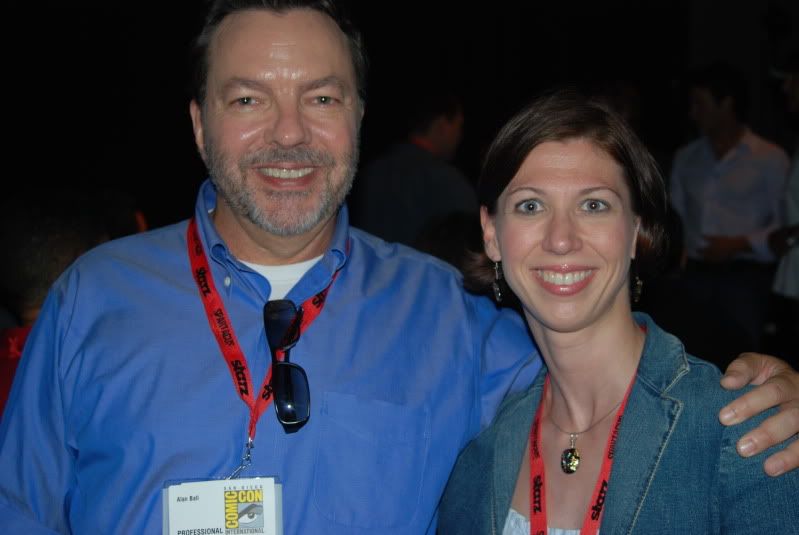
We ended an exceptionally busy and rewarding Comic-Con Saturday in an intimate press round table with the stars and producers of Discovery Channel’s hit science series MythBusters. For those of you who have not yet had an oportunity to check out this show, and are fans of great television science that entertains, it’s not too late to jump on board. In each episode, Jamie and Adam, aided by costars Grant Imahara and Tory Belleci, use basic elements of the scientific method to test the validity of various rumors, myths, movie scenes, internet videos and news stories in popular culture. It’s entertaining, explosive (sometimes literally!) and you get to learn cool science. What’s not to love? In fact, stars Jamie Hyneman and Adam Savage announced today at Comic-Con that they will be appearing on the September issue of Popular Mechanics. Fans can visit this site to enter to win one of 10 signed copies by the MythBusters themselves. Our discussion with the cast helped answer lots of behind-the-scenes about how the MythBusters episodes are filmed, where they get their source material and just how do they do that?!
From the Press Room: MythBusters
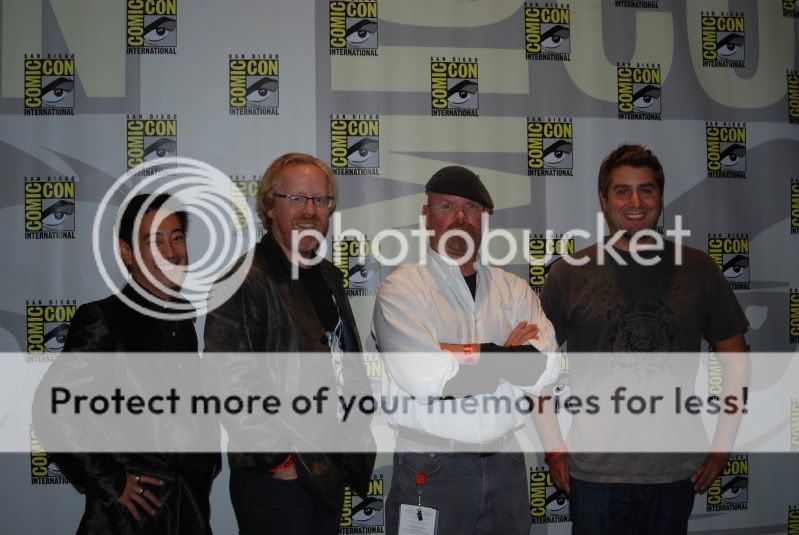
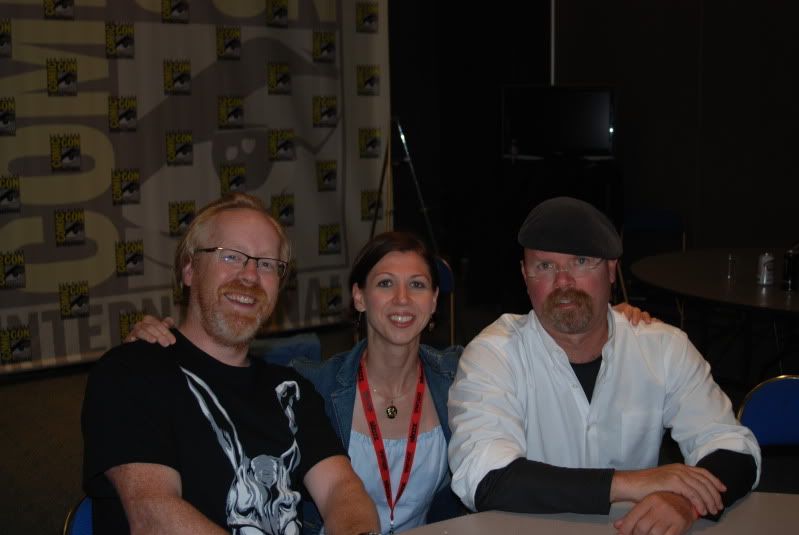
Press question: How did this all get started and how did you guys all find each other and say, “Hey! Let’s make a TV show out of having fun and blowing up stuff!”?
Adam Savage: Well, it’s not our idea. Actually, the original MythBusters creator found Jamie and I in the Spring of 2002. He was looking for special effects technicians to host a show based on busting or proving urban legends.
Jamie Hyneman: And his idea was to not just have us talk about these things but to replicate them and the fact that we build all sorts of unusual things was appropriate for that.
AS: And so Jamie gave me a call, asked me if I’d be interested in hosting it with him because he didn’t think he could quite hold the show on his own—
JH: I figured I’d find someone that was a little mit more of a ham than I am. And maybe we could bat it back and forth a little bit and it seems to work.
AS: So we shot the first pilots in the summer of 2002, and shot the first season in 8 months in 2003, 13 episodes, and then Discovery wanted 30 in the next year, and we had killed ourselves doing 13 episodes in 8 months, 6 days a week, 10 hours a day. So they said, “Maybe we need some more people to help bust myths. Let’s kill some other people!” So we brought in Tory and Carrie and Scotty Chapman, who was in that second season. And then Scotty left after the second season, basically because she wanted to do her own thing. She didn’t like the amount of time that doing television took. Since Jamie and I had worked with both Grant and Tory, Grant was somebody that we’d been thinking about for a long time that we wanted on the crew, and I’d called Tory when I’d called him and I said, “Dude, it’s Adam call me back! I’m gonna change your life.”
Tory Belleci: Well I’ve known these guys for over about 15 years. Jamie actually gave me my first job out of college doing model making. And then Adam I’d met up at ILM [Industrial Light and Magic]. He used to walk around like he had a TV show before he had one. He’d be walking around cracking jokes. I did this thing once where I took an X-acto knife blade, I snapped off the end and I glued it to my hand and put a little fake blood. He and I were working together on a model, and I kind of reached over and went, “Hey Adam, can you hand me that?” And freaked out. He was like, “Ahhhh!” And then he goes away and all of a sudden I hear everybody in the other room laughing their butts off and I walk in and he has taken a whole bunch and snapped them off and glued them to his head. And he’s like, “Heyyyyyy!”
AS: Can’t let a good idea go to waste!
Grant Imahara: I remember Tory and Adam and I were working on Matrix: Reloaded and Adam came in one day and said, “Hey! Me and Jamie got this gig! I’m gonna be flying in this lawn chair with all these balloons.” And I was like, “Heheh, you’re crazy!” So he left. And then Tory and I were working on Van Hesing about a year later and he was like, “Hey! I’m gonna join Adam and Jamie, it’s gonna be great!” And I was like, “Hehehe, you’re crazy!” And about a year after that I joined them. I’m crazy too.
Press question: Favorite myths? Maybe that you’ve done on the show and or favorite that you have yet to do—ideas that are growing.
JH: Well, favorite myth, hands down, for both Adam and I (I think) is “Lead Balloon.” Interestingly, it doesn’t involve any explosions or weapons or anything like that. But it’s—when you think about what we were able to pull off, the lead that we were using was .0001 in thickness, it was about like working with wet toilet paper, and yet we were able to build a balloon that was 14 feet across, weighed 28 pounds and it flew. And so what you have to do to pull that off is walk it through entirely in your head. And that’s how we design things. I think our greatest joy, even above all of this, is the design. It’s just a thrill, because a lot of the stuff like that hadn’t really been done before. And it’s like an adventure. It’s like climbing Mount Everest or whatever. For us, maybe it’s an adventure in our head, but it’s still an adventure that we don’t know how it’s going to turn out and it’s just thrilling.
AS: You lie there awake at night thinking through to tomorrow’s build, and thinking through, like, all the possible outcomes, including the one which took us a while to learn, which is what if nothing happens? Which is often one of the most dangerous situations that you can have. Push the plunger, dynamite’s live, nothing happens. It’s one of the most upsetting—
Press question: Yeah, that was a question I had, particularly when I watch one of the more perilous episodes, which is are there ever episodes that don’t make it to air?
AS: It’s rare. There is one story that we started working on that we stopped working on. And we won’t go near it again. What we were working with was just too dangerous and too unpredictable. And the second part is actually more important. The unpredictability is what made that story undoable. But I think that’s pretty much the only time that’s happened from us. Have you guys [Tory and Grant] had—you guys had a real problem with train suction, I remember.
GI: “Train Suction” took a long time. It took over a year to do and the reason is simply that we had to find a company that would work with us on allowing us to be that close to a moving train. A train moving at very high speeds.
AS: And then it was also a year spent not saying, “Could you get sucked off if you get too close to the train?” [laughter] Finding the right way to say that was difficult.
Press question: Can you talk about the bullet experiment? You talked about it on the panel.
AS: So, bullet drop versus fire, it’s a physics thought experiment that if you drop a bullet and fire it at the same instant in time, both bullets will hit the ground at the same time. Not including things like curvature of the earth in the equation. It’s something that we’ve always had on our list. When we get into these physics thought experiments, it’s one of my favorite things. Fertile territory. Things like airplane in a conveyor belt and swimming in syrup. We spent an entire day using a camera that filmed at 5,000 frames per second just making sure the bullet release was happening at the same time as the bullet leaving the gun. And that was the resolution that we needed to be able to watch these things happen simultaneously. An entire day doing that. And then an entire day finding the consistency of where our bullets would land so that we could know what our target zone was and what we could look for. Getting into that kind of percision over those long distances with things like guns is thrilling, but it also took a tremendous amount of mental effort to work through the thing repeatedly, work through the protocols so no one is where they shouldn’t be. Firing guns is never entertaining to me. It’s always, sure when you’re standing on the firing line and firing an MP-5 it can be a really fun experience, but you’re working with a crew, you’ve got to get the footage in, you’ve got to be safe, everyone has to be behind the line. And we all take that stuff super, super seriously.
JH: That particular story was also a good example of, you don’t really need to know how to do that. It’s kind of like, what practical use is that? Probably none. It’s the process, though, of what we had to go through that we had to figure out that intrigues us. It’s an exercise. It’s another tool in your arsenal to apply to anything. It answers questions someplace else that you may not be aware of.
AS: And just like “Swimming in Syrup” and “Airplane on a Conveyor Belt”, we know for a fact that no one’s done it. We’ve done a lot of experiments that we know other people have done. We’ve built a lot of research and our researchers are phenomenal. But then there are the ones like this, that we know when we do the final experiment full-scale, no one’s ever tried it before. We’re way out on this edge. Maybe not an edge of utility, But it is very thrilling for us to be doing that. Knowing that when someone sees this episode, when a physics teacher sees this episode, he doesn’t just have to say it’s so.
JH: There’s also another prime example of that, and that was “Polishing a Turd.” [laughter] I mean, you absolutely don’t need to know how to do that.
AS: But we’ve all done it professionally. We found polished earrings made of poo, didn’t we?
JH: But it’s about the process, and you find things along the way. We get a kick out of doing things that are so unlikely, like that. One of the things that we’re gonna be taking up here before long is a poo special. I think they were wanting to call it an excrement extravaganza. And this was another example that maybe you don’t need to know how to this, but when you start to look into it, for example, I had been fascinated with hybrid rockets that use pretty much any hydrocarbon along with nitrous oxide or some other oxidizer to make rocket fuel. So I wondered what are all the hydrocarbons that we can possibly use. Obviously you want it to be a dense one, and I went through the list, and I realized that poo is a hydrocarbon and made up of stuff that might be usable as fuel. And, it sounds ridiculous, but when you start to look into it, which I did, I found out that NASA had done quite a lot of testing on this because you’re going to Mars and you’ve got some people on board and where there’s people there’s poo. What else are you gonna do with it? You might get away with recycling your urine, but the poo is a little bit different.
AS: I think you can only eat it twice before it loses its nutrition. [groans]
ScriptPhD: Getting away from poo for a moment, I have a little two-part question about your source material. Can you talk about the process that you undergo when you choose the next myth or the next source material. And then, what is the difference between the material that just interests you because it’s cool and the material that you think is interesting and is feasible to build an episode around?
AS: Well those two things are inextricably linked. Because the show is built on all of our interest levels. I think what’s successful about the show is that we’re actually having a good time. And what we’re having a good time doing is not just blowing stuff up or getting to wear neat costumes, it’s primarily getting to satisfy our curiosity. So really the primary driver, and where a story is going to go, is what are we interested in doing? So our producer, who is the guy who goes up to Discovery and says we’re going to do a poo special and it’s going to go roughly like this, and we’ll look at that story and we might say, “Yeah I know when we first started this was the thing, but I’ve done some more research and actually this is a more interesting direction. Let’s go in this direction.” Because we know that when we’re interested in a direction, that footage is going to be more compelling.
SPhD: And what are the places that you go to to derive this stuff? Is it where your curiosity normally takes you—articles, journals, the internet?
AS: Well, I’ll give you an example. On Twitter, shortly after I started posting regularly, someone Tweeted a myth that said, “Dirty versus clean car as a myth.” Dirty car gets better gas mileage, because the dirt has a golf ball-like effect on the surface of the car and allows it to slip through the air. Dimples, in other words. And I knew, because I’ve sat next to Jamie on countless plane trips where he’s bent my ear going “I don’t know what the golf ball effect is, and why don’t planes have little golf ball dimples, and so on”, and I’m thinking, knowing that [Jamie’s] interested in that, the moment I heard this myth, it cascades into a story that I know is going to interest me. I know it’s going to be fascinating because we log these little things, these little trips, and we talk about them all the time. We’ve sat on planes where the guy behind us has said, “You guys really talk like this in the world!” [laughter]
Press question: what are Tory’s and Grant’s and Carrie’s roles in the planning of the episodes? Where do they come in?
TB: We have our own team. So [Jamie and Adam] have their own stories and then we get a whole list and we do look through them and ask, “What do you guys want? What do you want?” And if we’re really excited about a story, we’ll say “Oh what if we did this! What if we added this?” and we start building and then they’re like, “Yeah, you guys are psyched about it, run with it!” And then if it’s entertaining, we have to ask if there’s going to be enough to make it scientific and entertaining at the same time. And we do these story meetings where we just sit around and brainstorm about how we’re going to test this, or what if we added this or so on, and it just grows and builds.
Press question: So you guys [Jamie and Adam] are the cover guys, but there’s a real honest division of labor between you?
AS: Those are totally separate stories, yeah.
TB: But every once in a while, we’ll get a story where there’s a cross-over.
AS: Also, there’s stories where these guys will do preliminary work on and we’ll pick up years later and ask how they did, or we’ll be doing something that they did and we’ll ask them how they did that.
JH: A good example, if I can interject, was one that I believe has aired, which was “See-Saw Saga.” Both teams worked on this, and when I first saw this story, I went through it and said, first off, while it’s gruesome (because it involved a skydiver whose parachute didn’t open) it also was funny because he lands on a see-saw and a little girl gets launched up to ten stories in the air and walks away from it safely. Here, when you start to look at that, I start to see a lot of interesting stuff because the impact that this guy is creating is a lot of science, terminal velocity and it’s likely going to break the see-saw and all that stuff. There’s a lot of physics to consider here. The rig that we eventually try to do, shows that even if it didn’t happen, or couldn’t happen, we would try to make it happen. And the engineering involved with that was quite involved. We used CAD, we used a lot of high-end materials, we were able to invent something that hadn’t been made before. It was really quite cutting edge in its own way. And so there’s all the elements that you could possibly want in an episode in that one thing: humor, science, a lot of challenges, a lot of complexity and depth in the process.
AS: But also I have to say, and I think one of the things you were getting at, is it’s not like we get lists of things from a producer to go and do. The producer, Dan Tapster, will outline a whole season, because Discovery has to buy off a whole bunch of stories. But those outlines are the faintest of sketches. The actual construction process, the actual design process of an experiment, is driven by the team that is doing that experiment. So it’s so much more than being on-camera talent, and I think that’s one of the reasons that the show is still getting the same ratings it was getting six years ago. We’re still engaged and I think I can speak for all of us—after 168 hours of programming, we’re still having more fun now than we ever have. We feel consistenly more of a sense of ownership of the material as we go, as we get better at doing this, as we get better at spotting stories and chasing down these paths. The experimental designs just get more and more fun.
TB: We actually got a criticism from our producer, and he was like, “You know when an explosion happens (and we were looking at some past episodes), try not to triple orgasm, try not to do that. If it’s something that interests you, great, but not this over-excitement.” And we looked at each other thinking, “We actually were that excited!” You can’t hide your emotions.
GI: We’re involved with the design process of how to bust a myth, of the mechanical rigs. I think that if we weren’t, you wouldn’t be able to see that on camera, because we’re not actors. So, it’s hard to give the impression that you’re involved if you’re not involved. And so you’d like to be involved, I like to do my own research, I find the best way to sound like you know what you’re talking about is to actually know what you’re talking about.
AS: Well, I think it’s the thing I see when other networks attempt to replicate MythBusters style of show. What I consistently see is hosts that aren’t engaged with the material. And in fact, when I watched shows that I like, it’s hosts that are engaged with the material. It has nothing to do with the material itself.
SPhD: Can you offer any examples, obviously without calling someone out?
AS: I don’t wanna name names, because I don’t want to trash other shows.
JH: An example that goes indirectly at this is one of the things I never see on any of the other shows, as far as I’m aware, are tangents that sometimes go off in a different direction and when that happens with us, it’s because we have come up with some sort of a seed of an idea, and we start to go into it and then we find interesting things along the way. A lot of times, we’ll do a right turn off in some obscure direction, because we are fascinated. It’s like, “Wow, who knew that this would happen?” and I’m curious about it. And fortunately, production has learned to appreciate that this makes for something that actually has more depth to it. It’s not just picking a subject and linearly following it and busting the myth and that’s what it’s all about.
AS: I’ll give you a good example. One of the best informed to me, of the MythBusters offshoots, is ESPN’s Sports Science. That’s a terrific show. I love watching it. But I think that what they spend a half hour on would take us six minutes of screen time to explain and demonstrate. There aren’t really hosts of that show. They have an outline and they methodically go down it. And they shoot down their targets as they’re going. And I think Jamie is absolutely right. It’s those tangents where you get those—because to us, the soul of the show is just these two guys on a Sunday in their garage. What would they do?
SPhD: Well as a build-off of this answer, and your previous comment, Tory, about the mix of the science and the entertainment, who do you view as your audience? Because there are a lot of spin-offs and there’s a lot of material available now. Do you sort of feel like there’s a certain demographic that is there, and then you tailor the show to them, or do you have an idea, you go with it, and it’s a wide spectrum of people who will come?
JH: Yes, we’re actually just having fun and screwing around. It seems to work. And yes we will be premeditative about it in the sense of my previous example with the see-saw thing. We can see certain elements in it that make for a clear trail of a good story. It’s got all the makings and we’ll make sure that we have that balance in it and make it into a composition that way, but as far as tailoring to an audience? It’s pretty much we’re just believers in the honesty of the approach. We’re just having a good time, we’re exploring, it’s an adventure for us to do what we do, and while we’re aware that the cameras are there, at least in my case, it’s just a pain in the ass. I would say get out of my way.
AS: One of the surprising and impressive things about the show is the feedback we get from kids saying it’s interesting, parents saying it’s interesting, our kids like the science, science teachers saying that their Thursday morning class discussions are the liveliest of the week because of what happens on our show the night before. The National and California Science Teachers’ Association have made us honorary lifetime members. But what we love saying is that if we’d set out to make a show that was “educational”, we would have failed miserably. It’s not by design. We understand that that is the case now, and yes, we can look down the throat of a narrative and say, yes, let’s bring in this element, and let’s bring in this here, and then in the middle of that demonstration, something really remarkable might happen. We’ll go down a different path. Most shows, like Bill Nye’s and those types of shows, are demonstration shows. They describe a concept and then they demonstrate it. We are steadfastly not a demonstration show. We’re an experimentation show. Because we don’t know what’s going to happen when we’re setting up to do something. Sometimes we do, but honestly, the largest proportion of the time we’re surprised.
JH: A lot of times, we think we do and it turns out that we don’t. And that, for us, is the best thing because it means that we learned something in the process. In my sense, the biggest excitement and bonus of doing this show is what I personally learned.
AS: I’m not going to give you the result of “Dirty Versus Clean”, but the result was so shocking to us that we literally just sat there and giggled on camera. We were totally wrong and so were all the experts. It’s great!
Press question: Have you gotten any interesting feedback from academic scientists?
JH: All the time. We get insulted about things that we’ve done, we get questions. A lot of time the inquires are just, “What kind of material do you use or where did you access it?” But we’ve had pretty much any scientific institution that you can name has contacted us in one way or another with some kind of inquiry.
AS: It’s not like we actually engage in discussions where they’re like, “We think you got this experiment wrong.” Actually, I think there’s a real clear understanding in the scientific community that these aren’t publishable results we’re coming up with. But what they see that we’re doing that’s a benefit, is that we’re doing things like, we’re showing you that we were wrong about our intuition. We’re showing you that the experts helping us to make wild-ass guesses were wrong. We’re showing that science is this very messy process. We’ll spend an entire episode realizing we’ve been asking the wrong question. And that’s really important, that people see that science isn’t guys in white lab coats going, “It’s just as I expected!”, it’s people going, “What do we do now?! Where do we go from here? We got this result and I have no idea where to put it.” To show science as such a creative process.
Press question: One question that isn’t in your bios. Which of you has the most degrees piled up?
GI: Electroengineering. A degree. Bachelor’s of science.
Press question: And second question. Have you done a do-over episode yet?
AS: Oh, we’ve done dozens of do-over episodes! There are a lot of stories we’ve gone back on with new data, new material, new information. Because fans will absolutely spell it all out for us when they think we’ve got something off. And if it’s enough material for us to come up with a different conclusion, and I love that! I’m always saying, “Wouldn’t you love to watch the History Channel, and have them air a disclaimer saying “You know all those Nostradamus documentaries we’ve been wasting your life with? Turns out it’s all crap! Sorry!””
Press question: Adam, you mentioned in the panel, somebody asked about Bigfoot, and doing an episode about that, and you said, “We’re not into proving negatives.” Can you talk about that?
AS: Well, if you are going to tackle ghosts, you’re going to have two outcomes: you’re either going to find a ghost or you’re not. If you don’t find a ghost, that doesn’t mean they don’t exist. All you’ve done is proved that you couldn’t find a ghost. There’s not much that’s scientific in that. You’ve just demonstrated the negative, you haven’t demonstrated the positive.
JH: That’s the super part in supernatural. There may be something there that doesn’t fit within science or things that you can test, things that you can wrap your brain around other than being able to say, “Well, we weren’t able to find anything.” While we are at times coming up with results that are not definitive, well that’s most of the time, we’ve got a sample size of one or sometimes three, if we’re lucky. It doesn’t mean that we’re going to go off on wild goose chases after things and make statements about stuff that is out there.
SPhD: Right down the line, favorite episode to date?
TB: My favorite episode would probably be “Red Flag to a Bull.”
AS: For me, it’s “Lead Balloon.”
JH: Same.
GI: Probably the Wanted myth, where we tested the curving of a bullet. The experimental design was really fantastic.
I know you’ve been waiting for it, folks! The Day 3 Comic-Con Costume of the Day. Today was a very tough call. Compounding the fact that Saturday tends to be the busiest day at the Con, it is also the night of the annual Costume Masquerade Ball, so it definitely brings out the creativity. Our pick is a graphic designer whose costume took over two hours to put on, with some very neat results:
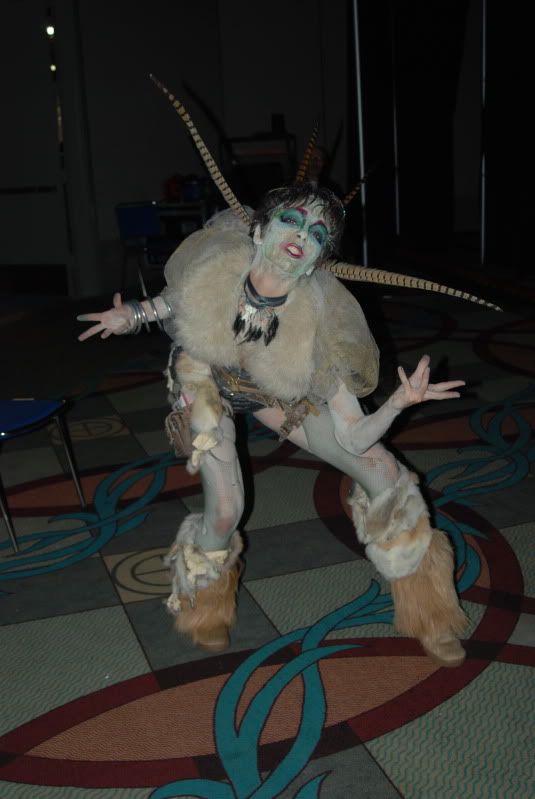
Please come back tomorrow as we close out a relatively relaxed last day with two amazing final panels (the inimitable Dr. Who and Supernatural) and our first visit to Hell on Earththe always packed convention floor. Good night!
~*ScriptPhD*~
3 thoughts on “Comic-Con 2009: DAY 3 Coverage”